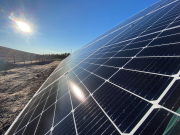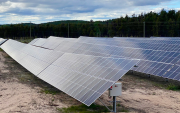Ottawa has announced that it will provide welcome financial support to help ramp up clean energy capacity in Indigenous communities in British Columbia. Monday’s announcement comes as a positive sign that the federal government’s promises to invest in renewed relationships with Indigenous peoples are being realized.
According to Navdeep Bains, Minister of Innovation, Science and Economic Development, the B.C. Indigenous Clean Energy Initiative will receive $3.95 million in funding through Western Economic Diversification Canada to help First Nation communities adopt and implement clean energy projects. According to the statement, these funds will help generate awareness of clean energy systems, provide capital funding, and facilitate private sector partnerships and access to capital needed to build projects.
A welcome opportunity to improve communities
 This clear support from the federal government provides a welcome opportunity to help improve the energy conditions of Indigenous communities. Many remote Indigenous communities, for example, are in need of support to help phase out diesel-powered systems. Of the 292 remote communities in Canada, 257 of these are not connected to any provincial or territorial electrical grids and have their own microgrid networks (predominately run by large diesel-powered generators). These communities collectively consume more than 90 million litres of diesel fuel every year, producing greenhouse gases that directly contribute to climate change. Diesel combustion is also responsible for particulate matter air pollution and can contaminate soil and water during transportation and storage when spills occur.
This clear support from the federal government provides a welcome opportunity to help improve the energy conditions of Indigenous communities. Many remote Indigenous communities, for example, are in need of support to help phase out diesel-powered systems. Of the 292 remote communities in Canada, 257 of these are not connected to any provincial or territorial electrical grids and have their own microgrid networks (predominately run by large diesel-powered generators). These communities collectively consume more than 90 million litres of diesel fuel every year, producing greenhouse gases that directly contribute to climate change. Diesel combustion is also responsible for particulate matter air pollution and can contaminate soil and water during transportation and storage when spills occur.
Timing of this week’s announcement comes on the heels of the Pembina Institute’s second biennial Renewables in Remote Microgrids conference, which was hosted by the Government of Northwest Territories with support from Bullfrog Power. Held in Yellowknife in September 2015, the conference focused on the theme Innovation and Resiliency on the microgrid. The message at the conference was loud and clear: Indigenous communities are excited, ambitious and ready to be part of this transformation.
Investing in clean energy in Indigenous communities offers the opportunity to not only help solve energy resilience issues — such as avoiding new load restrictions and electricity brownouts — but also help improve the health and wellness of Indigenous peoples as inadequate residential housing is replaced with new energy efficient designs and retrofits.
The Pembina Institute is pleased to see the government’s commitment to partnering with Indigenous nations to advance clean energy and sustainability solutions. It is an opportunity for the federal government to live up to its Truth and Reconciliation commitments and to demonstrate internationally how a government can effectively provide affordable, clean energy to marginalized peoples. Transitioning to locally owned clean energy can create a positive return on investment, the revenues from which can be directed to other areas such as housing, education and health.
More room for support
 Canada has an unprecedented leadership opportunity to work together with Indigenous nations as they shift away from reliance on fossil fuels toward harnessing the power of the sun, wind, water and earth. Supporting Indigenous communities in achieving these goals can also support their ambitions to reconnect with core traditional values: using the clean, natural land and the resources the earth offers to sustain and support their way of life.
Canada has an unprecedented leadership opportunity to work together with Indigenous nations as they shift away from reliance on fossil fuels toward harnessing the power of the sun, wind, water and earth. Supporting Indigenous communities in achieving these goals can also support their ambitions to reconnect with core traditional values: using the clean, natural land and the resources the earth offers to sustain and support their way of life.
Some key areas we believe the government can further support and act on include:
- Provide assistance to help transition away from fossil fuel subsidies and toward investments in clean technologies and systems.
- Re-introduce a federal power production incentive program that would pay an equitable dividend for electricity produced from clean energy sources, specifically for remote communities. The federal ecoENERGY for Renewable Power program (shelved in 2011) provided such financial incentives for clean energy projects.
- Further invest in local energy literacy, knowledge, capacity and the ability for Indigenous communities to own, operate and maintain clean energy systems.
Monday’s announcement should be lauded for its focus on supporting Indigenous community development by fostering local economic development potential. The Pembina Institute looks forward to working with Indigenous nations and the Government of Canada on solutions such as these that advance climate action in Canada with a special focus on helping to address this long-ignored energy issue.









